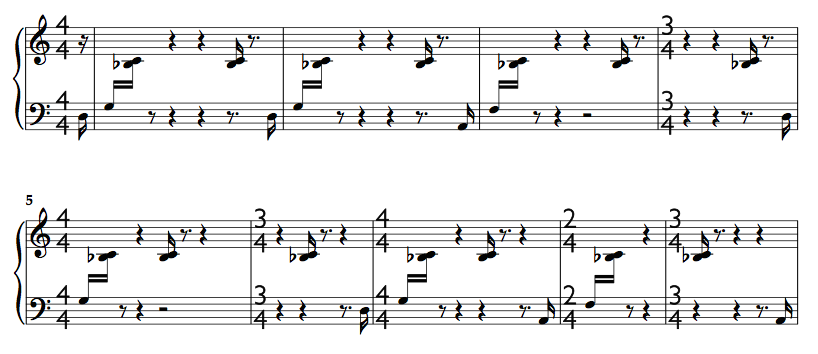|
I’m working on an album project called Inventions. It originated with my Piano Inventions from Banff in 2010, a set of solo piano pieces derived from recordings of free improvisations. I wrote another set in a similar manner in 2015. I recorded them the other day with John Dieterich, who is in a really good band and possesses some unusual microphones. As in much of my piano music, there’s some exploration of unique resonances set up using silently held keys and my favorite tool, the sostenuto pedal. This is the middle pedal of the piano, which—unlike the more commonly used damper pedal on the right—sustains just the notes you’re holding on the keyboard, rather than lifting the dampers for the whole instrument. A sound has four phases, they tell me: attack, sustain, decay, and release. Pianos, being percussion instruments, are most characterized by the first phase. You hit a note. That’s the attack. If you hold the key down (or if you employ the middle or damper pedal) you keep hearing sound, but you aren’t really hearing sustain; unlike, say, the human voice, we have no way on the piano of continuing or growing a tone. As soon as the note sounds, it immediately begins to decay. When you lift the key, or the pedal, there is a similarly audible release. The music of my Inventions operates under the premise that music takes place during the (non-notated) decay of tones, and at their (sometimes, in my system, emphasized) releases, not just at their (traditionally notated) attacks. But there is an equally characteristic second premise here: a flat refusal to explore the first one in any sort of systematic way. Because after all this isn’t really a discursive premise of an argument; what it is is a natural interest of a human being. Interests are like love. They aren’t so clearly delineated. Their subjects and objects are blurred around the edges. They don’t exist for a specific purpose. We don’t ask them to emerge and we don’t use them for anything. We just have them. And they shift as they will. So I might draw a comparison to a piece of music I’ve been thinking about lately: Dan Trueman and Adam Sliwinski’s album Nostalgic Synchronic, which explores and demonstrates Trueman’s software instrument the prepared digital piano. He hasn’t set up a complete compendium of all the instrument’s possibilities, but a left-brain effort has been made to show a range of its technical potentials. This connects with my old saw about “exploiting material” in composition. The question is whether one has subjected one’s ideas to a thorough going-over, or not. My argument has been, and remains, that while the first approach is perfectly valid (as the whole European heritage of classical music stands to demonstrate), the second is also. Example: the opening idea in one of my Inventions, “Church Dust.” I’m tempted to call it a groove, but it isn’t, because it never settles in. It does not predictably repeat, nor are the rhythmic variations logically explicated. They just flow from one to the next, at the speed of thought and with the logic of memory. This was an improvisation; so I took the first idea as a premise and continued and played with it, but I did not stop to notate it, analyze it, and consider my options. When it comes back slightly different later, it’s because I didn’t necessarily remember it the same way I played it the first time. John said something about writing through improvisation—that this way we arrive at different forms that we’d never create if we were working on paper. That’s a good point. Not just for macroforms but also for the individual variations in a single idea.
In this as in other things I have been guided by the flowing, not-quite-repeating music of Peter Garland. The ideas in his music feel connected, even when traditional motivic relationships are hard to isolate, because the ideas move from one to the next at the speed of thought. One of his longer pieces, like either of the two string quartets, proceeds like a long solitary walk. You might think of a memory, a person from your past, something about food, something about politics, something from a book you've been reading. On the surface, these objects of contemplation have little to do with one another. And yet meaning spontaneously arises from their juxtaposition. Connections, while not inherent, emerge.
0 Comments
Your comment will be posted after it is approved.
Leave a Reply. |
A Selection• Gone Walkabout
• Migration • Music as Drama • Crossroads II • 10 Best of 2014 • January: Wyoming and the Open • February: New Mexico and the Holes • Coming Up • Notes on The Accounts • Crossroad Blues • Labyrinths Archives
October 2020
|


 RSS Feed
RSS Feed